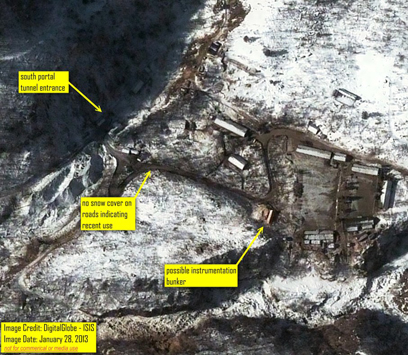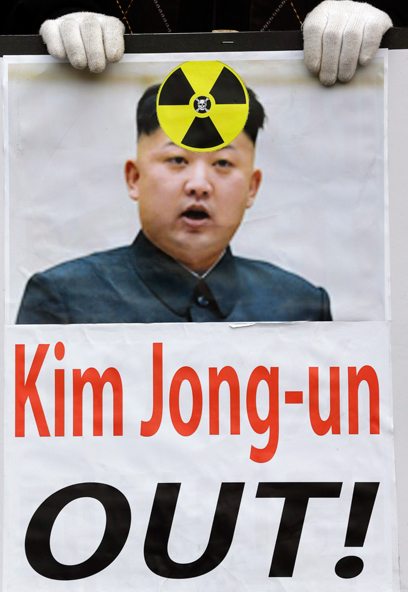North Korea's nuke test encourages Iran
Analysis: Pyongyang's conduct teaches Tehran it can lift Western sanctions without halting nuke program
The nuclear test North Korea conducted early Tuesday has harsh ramifications for Israel, as Pyongyang is showing Iran that it is possible to defy the international community, disregard the restrictions and prohibitions and even benefit from this sort of conduct.
North Korea's "extortion system" was introduced in 1993. It is based on the development of nuclear weapons and ballistic missiles. After every nuclear test or long-range ballistic missile test-launch, the international community imposes additional sanctions on North Korea, yet at the same time it offers to conduct negotiations with it. These negotiations are usually headed by a group of countries that includes Russia, China, Japan, South Korea and the US. As the negotiations draw to a close, North Korea promises to disarm itself of nuclear weapons or stop conducting missile tests – or even both. Then it receives aid in the form of petrol and food it needs in order to feed the hungry masses. But Pyongyang always reverts to its old habits.
North Korea held its first nuclear test in 2006. The second one was held underground in 2009, and the third one was held today. In the interim it conducted ballistic missile tests. What is Iran supposed to learn from this? The conclusion is pretty clear: In order to lift the sanctions imposed by the Western nations Iran does not have to surrender to them. On the contrary, it should complete its nuclear program and then enter into real negotiations with the West from a position of power.
Defense Minister Ehud Barak said over a year ago that North Korea is like an ice breaker ship that clears the way for the Iranian military nuclear ship. This is precisely what is happening, and this is why the nuclear explosion this morning does not bode well for Israel. In roughly two weeks the permanent members of the UN Security Council, along with Germany, plan to begin negotiations with Iran in Kazakhstan. If the talks with North Korea are any indication, the next round of talks with Tehran will also fail to yield any results. Iranian scientists, by the way, were present during North Korea's previous nuclear test in 2009.
The two previous nuclear tests were held during the days of Kim Jong-il, the father of the current North Korean ruler, Kim Jong-Un, who apparently learned from his father that while nuclear weapons and missiles can be used to extort food and petrol from the West, the main reason behind the nuclear tests, which were condemned worldwide, is the desire to deter the West from trying to topple the regime in Pyongyang by force. Extortion alongside military deterrence is the name of the game.

Test's area, the Yongbyon Nuclear Center (Photo: ISIS)
North Korea sells its nuclear knowledge and its missiles to the highest bidder, and it is also responsible for the transfer of ballistic missiles and rockets to Syria, Iran and even Egypt. Actually, all the Arab states purchased rockets and missiles, or knowledge on how to manufacture them, from North Korea, for a hefty price. The sanctions imposed by the UN on the importing and exporting of weapons from North Korea did not help, even when North Korean ships that were transporting weapons were intercepted and when China, Pyongyang's only ally, threatened to stop food and petrol shipments to North Korea.
Western intelligence officials estimated that the famine in North Korea would cause the Asian country to step up its defiance against the West, and this is exactly what happened. A few weeks ago, despite the UN's warnings, North Korea launched a satellite into space with a ballistic missile. The West claimed the ballistic missile used to launch the satellite was actually a long-range ballistic missile that is capable of reaching the US. A previous test-launch of this missile conducted last year failed.

Anti-N. Korea poster in Seoul (Photo: Reuters)
Following the launching of the satellite and missile, the Security Council threatened to impose harsh sanctions on North Korea. North Korea's answer to the threat was this morning's nuclear test, which was conducted despite the fact that Western intelligence agencies had prior knowledge of it and warned Pyongyang against carrying it out. The reason: North Korea is looking to integrate its nuclear capabilities and ballistic missiles into the "extortion game" so that it will later be able to tell the West it will give up these capabilities if the sanctions against it are lifted.
As for North Korea's nuclear capabilities, it should be noted that the two previous nuclear tests it conducted were apparently not such great successes and the explosions were partial. Judging by the 4.9-magnitude earthquake that was felt this morning as a result of the explosion, it appears that North Korea's latest test was successful. It is possible that the current nuclear test succeeded because Pyongyang used enriched uranium, as opposed to plutonium, which was used in the previous tests.
This fact is also a cause for concern, because North Korea has sold its nuclear knowledge to Bashar Assad's regime in Syria and even built a nuclear reactor for him. According to foreign media outlets, the reactor was destroyed by Israel.
The nuclear cooperation between North Korea and Iran, as well as their cooperation vis-à-vis ballistic missiles, is almost a known fact. This is yet another reason why this morning's nuclear explosion should be a great cause for concern for Israel.










